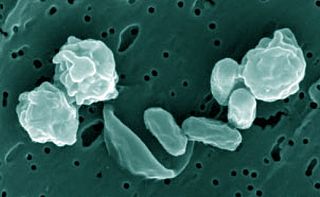Lysinibacillus sphaericus is a Gram-positive, mesophilic, rod-shaped bacterium commonly found on soil. It can form resistant endospores that are tolerant to high temperatures, chemicals and ultraviolet light and can remain viable for long periods of time. It is of particular interest to the World Health Organization due to the larvicide effect of some strains against two mosquito genera, more effective than Bacillus thuringiensis, frequently used as a biological pest control. L. sphaericus cells in a vegetative state are also effective against Aedes aegypti larvae, an important vector of yellow fever and dengue viruses.

Bacillus odysseyi is a Gram-positive, aerobic, rod-shaped, round-spore- and endospore-forming eubacterium of the genus Bacillus. This novel species was discovered by scientist Myron T. La Duc of NASA’s Biotechnology and Planetary Protection Group, a unit whose purpose is to clean and sterilize spacecraft so as not to have microorganisms contaminate other celestial bodies or foreign microorganisms contaminate Earth, on the surface of the Mars Odyssey in a clean room at the Jet Propulsion Laboratory in La Cañada Flintridge before the spacecraft was launched to space. La Duc named the bacterium Bacillus odysseyi sp. nov. after the Odyssey mission. It had apparently evolved to live in the sparse environment of a clean room, and its secondary spore coat makes it especially resistant to radiation.
Lysinibacillus fusiformis is a gram-positive, rod-shaped bacterium of the genus Lysinibacillus. Scientists have yet to completely characterize this microbe's pathogenic nature. Though little is known about this organism, several genome sequencing projects for various strains of L. fusiformis are currently underway.
Lysinibacillus boronitolerans is a spore-forming, Gram-positive, motile, rod-shaped and boron-tolerant bacterium with type strain 10aT.
Myceligenerans crystallogenes is a xylan-degrading bacterium from the genus Myceligenerans which has been isolated from tufa from the Catacomb of Domitilla in Rome, Italy.
Mucilaginibacter gracilis is a Gram-negative, facultatively aerobic, heterotrophic and non-motile bacterium from the genus of Mucilaginibacter which has been isolated from Sphagnum peat bog in the Tomsk Region in Russia.
Mucilaginibacter jinjuensis is a Gram-negative and rod-shaped bacterium from the genus of Mucilaginibacter which has been isolated from rotten wood in Jinju in Korea. Mucilaginibacter jinjuensis has the ability to degrade xylan.
Mucilaginibacter paludis is a facultatively aerobic and heterotrophic bacterium from the genus of Mucilaginibacter which has been isolated from acidic Sphagnum peat bog in western Siberia in Russia. Mucilaginibacter paludis has the ability to degrade pectin, xylan and laminarin.
Microbacterium xylanilyticum is a Gram-positive, non-spore-forming, xylan-degrading and non-motile bacterium from the genus Microbacterium which has been isolated from sludge in Cheongju in Korea.
Lacrimispora algidixylanolyticum is an obligately anaerobic, psychrotolerant, xylan-degrading and spore-forming bacterium from the genus of Lacrimispora which has been isolated from vacuum packed lamb in New Zealand.
Lysinibacillus alkalisoli is a Gram-positive, aerobic and motile bacterium from the genus of Lysinibacillus which has been isolated from saline-alkaline soil from Hanggin Banner.
Lysinibacillus contaminans is a Gram-positive, aerobic and endospore-forming bacterium from the genus of Lysinibacillus which has been isolated from surface water.
Lysinibacillus cresolivorans is a Gram-positive, facultatively anaerobic, rod-shaped and endospore-forming bacterium from the genus of Lysinibacillus.
Lysinibacillus endophyticus is a Gram-positive, aerobic and rod-shaped bacterium from the genus of Lysinibacillus which has been isolated from the root of a maize plant. Lysinibacillus endophyticus produces indole-3-acetic acid.
Lysinibacillus halotolerans is a Gram-positive, aerobic, halotolerant, endospore-forming and rod-shaped bacterium from the genus of Lysinibacillus which has been isolated from saline-alkaline soil from Lingxian County.
Lysinibacillus louembei is a Gram-positive, aerobic, rod-shaped and motile bacterium from the genus of Lysinibacillus.
Lysinibacillus meyeri is a Gram-positive bacterium from the genus of Lysinibacillus which has been isolated from a medical practice.
Lysinibacillus parviboronicapiens is a Gram-positive, rod-shaped, spore-forming and motile bacterium from the genus of Lysinibacillus which has been isolated from soil.
Lysinibacillus tabacifolii is a Gram-positive, strictly aerobic and endospore-forming bacterium from the genus of Lysinibacillus which has been isolated from leaves of the plant Nicotiana tabacum.
Lysinibacillus telephonicus is a Gram-positive, aerobic, rod-shaped, endospore-forming and motile bacterium from the genus of Lysinibacillus which has been isolated from the screen of a cellular phone.
